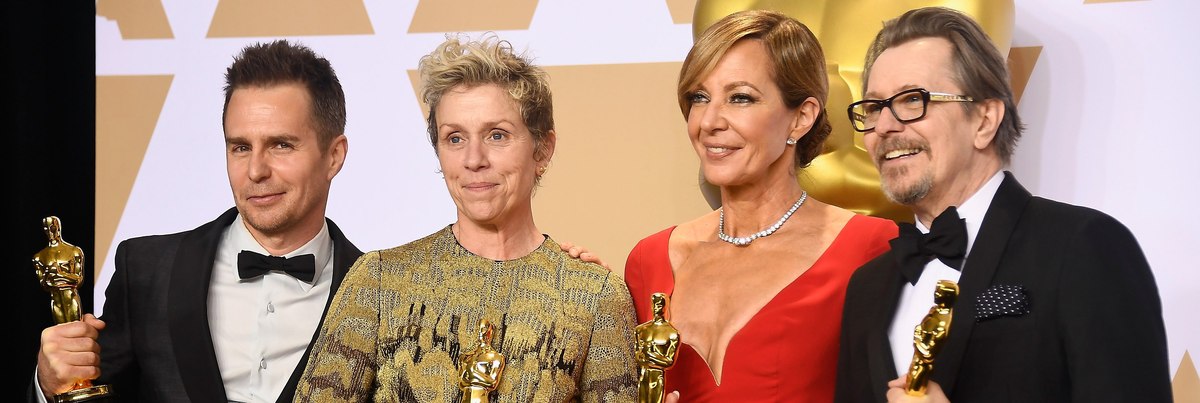A majority (84%) of Republicans say it’s inappropriate for Oscar winners or hosts to discuss politics in their speeches, but only 22% of Democrats say the same.
Last year’s Academy Awards ceremony had its share of political moments: host Jimmy Kimmel addressed the importance of the #MeToo movement, Best Actress winner Frances McDormand called for more diversity in Hollywood, presenters Lupita Nyong’o and Kumail Nanjiani honored “Dreamers,” and the ceremony dedicated a segment to Time’s Up, a movement against sexual harassment and misconduct.
This year’s Oscars may prove similarly political, with several nominations for films that take on issues of race (BlacKkKlansman, Green Book, Black Panther), LGBTQ identities (Bohemian Rhapsody), and political controversy (Vice).
Almost half (49%) of Americans expect that this year’s Oscars ceremony will be more political than usual, but a similar number (48%) also say it is “inappropriate” for Oscar winners and hosts to discuss politics in their speeches. A strong majority (84%) of Republicans feel it is inappropriate, while less than a quarter (22%) of Democrats feel similar. Overall, 31% of Americans say it’s appropriate for celebrities to discuss politics in their speeches. Among those who say they are planning to watch this year, that number rises to 54%.
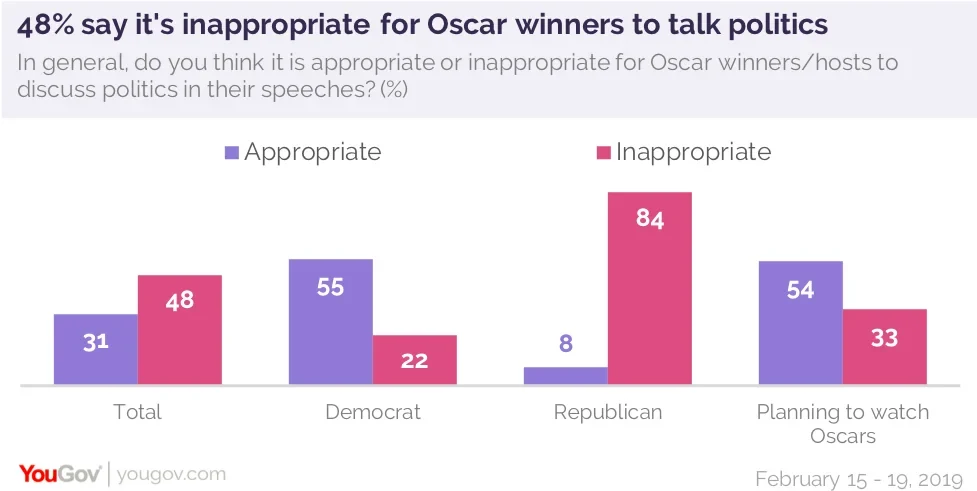
One in five (20%) Americans believe that this year’s ceremony will be no more or less political than the Oscars usually are, and only 2% say this year will be less political than usual.
There has already been some controversy, political and otherwise, when it comes to this year’s Academy Awards ceremony.
Americans are evenly split over Kevin Hart hosting
The Oscars will not have a host this year, after comedian and actor Kevin Hart dropped out of the role. Shortly after it was announced that Hart would be hosting the Oscars, a number of homophobic comments he made roughly a decade ago on social media attracted attention, and he stepped down from hosting. Initially, he refused to apologize, though he later did post statements to Twitter reading “I sincerely apologize to the LGBTQ community for my insensitive words from my past. I'm sorry that I hurt people. I am evolving and want to continue to do so.”
Americans are evenly split on whether they agree (34%) or disagree (34%) with Hart’s decision to step down. Among those who say they are planning to watch the Oscars, 50% say they agree with Hart’s decision. Democrats and Republicans tend to be divided: while 45% of Democrats support Hart stepping down due to his previous comments, only 23% of Republicans say the same.
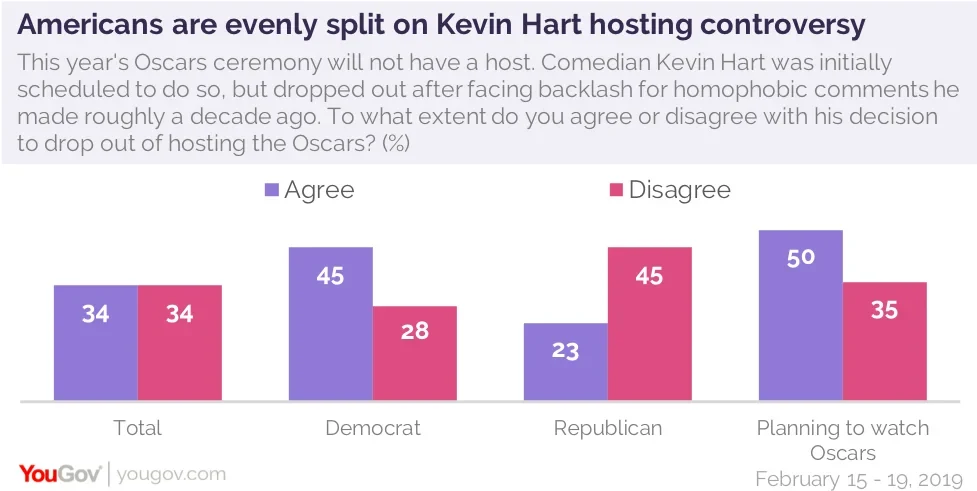
As for who Americans think would have been the best possible choice to host the Oscars this year, Hart is actually the second-most-popular choice, with 8% of the vote. The only more popular choice was Dwayne “The Rock” Johnson, who 12% of Americans would’ve liked to see host the ceremony. Melissa McCarthy (6%) and Tina Fey (6%) were other popular picks. Among those who are planning to watch the Oscars, Melissa McCarthy is a close second (13%) behind Dwayne Johnson (14%).
This will be the second time in the Oscars’ existence that the ceremony will not have a host. The first was in 1989, and is considered by some to be the worst Oscars ceremony ever.
Over one-third would have welcomed Best Popular Film category
Another somewhat controversial event around this year’s Oscars involved the (temporary) introduction of a new category: Best Popular Film. In August, the Academy announced this category would be introduced at this year’s awards ceremony, but they later stated that it would instead be postponed to “examine and seek additional input regarding the new category.”
Over one-third (35%) of Americans support the idea of adding this category this year, while 11% are opposed--among whom 53% said they were against it because they didn’t believe adding the category was necessary. Half (50%) saw it as “an attempt to please the masses,” while 37% believe it would’ve just been “a consolation prize to Best Picture.”
These are the awards Americans would be excited to see presented at the Oscars
Though sentiment around Best Popular Film may have been lukewarm, there are other awards that Americans are more likely to say they’d like to see presented at the Oscars. Half (50%) say they would be excited if the Academy added an award for “Best Breakthrough Performance,” awarded to a first-time or rookie performer. A similar number say they would be excited about an award for “First-Time Film” (47%), awarded to a new director, and “Best Voice-Over Performance” (47%), awarded to those who voiced characters in animated films. Roughly four in ten (41%) would be excited about an award for “Best Stunt Coordinator.”
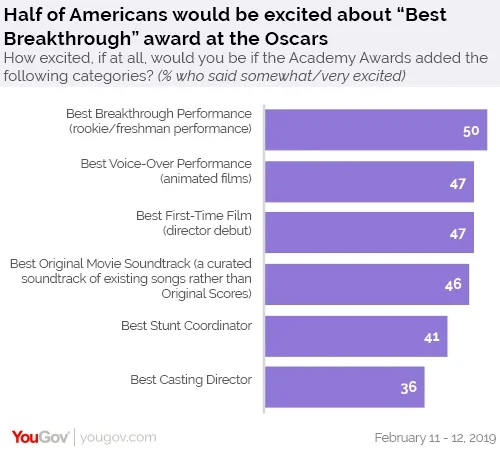
In recent years, there has been an increased push for diversity in Hollywood. One of the people who can ensure diversity in a film’s cast is, of course, the casting director. While 36% of Americans overall would be enthusiastic about an award to recognize the best casting director, a much higher percentage (57%) of black Americans say they would be excited about this award. Almost half (49%) of Hispanics responded similarly.
As for existing Oscar awards, roughly half of Americans don’t seem to care very much about the winners for three of the major awards. When asked if they’re generally more or less likely to see a film that has won Best Picture, 34% say they’d be more likely to see it, but 47% say it wouldn’t make a difference. Similarly, 27% would be more likely to see a movie featuring either a Best Actor or Actress winner, while 53% say it wouldn’t affect their decision.
But among those who say they are planning to watch the Oscars on Sunday, a majority (70%) say that they are more likely to see a film that wins the Best Picture award. This group is also generally more likely to see a film featuring the Best Actor (62%) or Best Actress (61%).
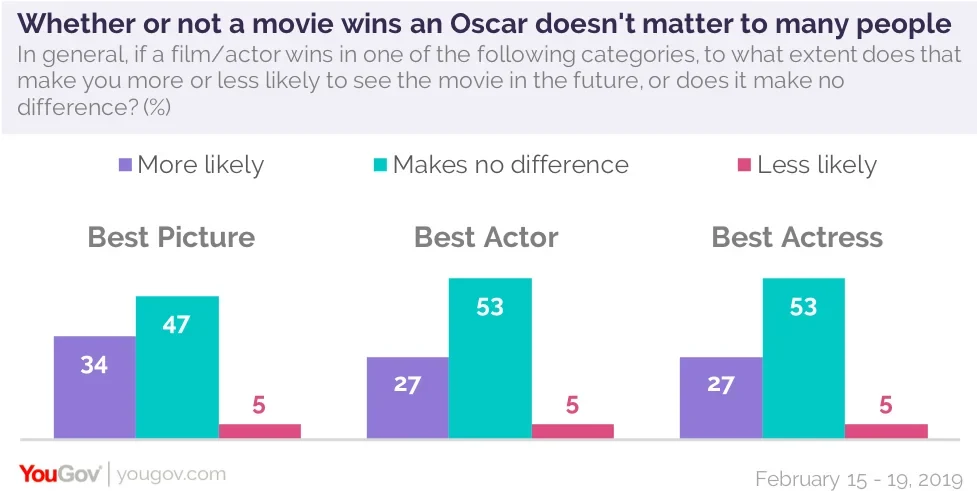
In general, the Best Picture award may not actually be all that important to most Americans. A mere 15% correctly identify the film that won Best Picture in 2018. (It was The Shape of Water). Another 17% of Americans guess it was one of the other nominated films, while 22% say they can’t remember which film won. The most common answer is “I never knew who won this award.” (45%).
See full results from these polls here and here.
Image: Getty
